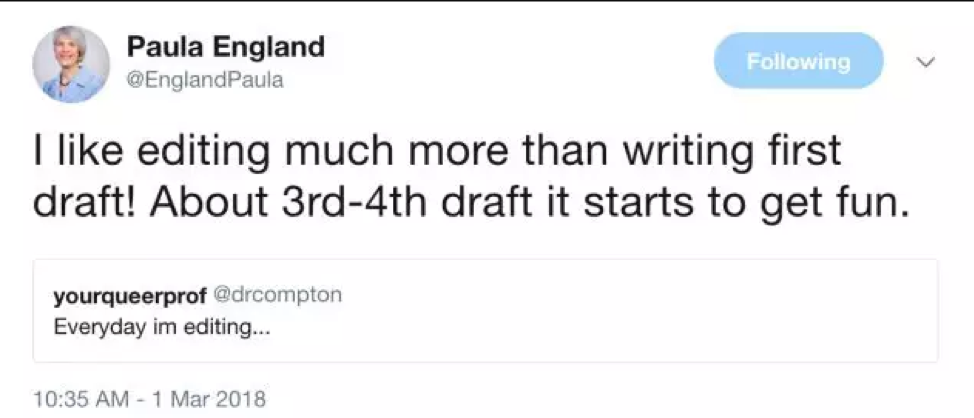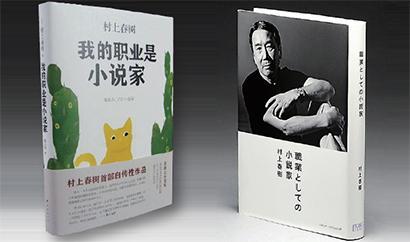|
Note: This article was first written in Chinese on March 4, 2018 and translated into English in 2022. Last time, I wrote an article titled, “Insights on writing: Making writing into a daily habit”. In that article, I promised my readers that I would talk about editing and revising in a future article. My academic idol Dr. Paula England recently tweeted something and I couldn’t agree more with what she said. More and more I’m starting to realize that, like Dr. England, I enjoy “editing much more than writing first draft.” It’s so easy to become so caught up in the process of editing to the point where I become hooked. When I collaborate with someone for the first time, they sometimes take slight offense when I’ve edited so much of their writing. Once they get to know me, however, they come to learn that when I edit, I always restructure the article including its paragraphs, sentences, and word choice. Today, I’m sharing my editing process partly because I was inspired by Haruki Murakami’s book “My Profession is a Novelist”. Writing a novel is quite unlike writing an academic paper, but Murakami’s process of revising his writing is so relatable to me. Next, I will draw upon excerpts from his original work and discuss my thoughts on editing academic papers. The process of writing long novels isn’t like playing baseball such that completion marks the start of another game. If you ask me, the point at which a novel is finished signals the beginning of the most enjoyable part that’s worth your while. Similar to Murakami, I usually take a break after completing the first draft of an article. If I have collaborators, I’ll send the draft to them. But after the initial draft, as Murakami describes, it’s “a rewrite from the very beginning, a process that is carried out on a fairly large scale”. During the first round of revision, I mainly look at whether the literature review is comprehensive and logical, and rearrange the paragraphs if needed. For example, in a recent article, my collaborator was responsible for writing the first portion of the literature review. Then when I read through it, I noticed that the deduction from the literature review to the research hypotheses was a little disjointed from our empirical analysis. I ended up cutting out a lot of what she had written. I also took arguments she had interspersed throughout the paper and combined them into one paragraph. As a result, the literature review, the formulation of research hypotheses, and the empirical analysis became more coherent. Once this process is complete, I will set my work aside for another week and then enter the second round of revision. This time, likewise, I will make drastic changes and do a rewrite from the beginning, but with greater attention to detail. For instance, I might add some detailed descriptions of scenery and adjust the tone of conversations. I might check for inconsistencies with the plot development, and rewrite parts of the story that are difficult to understand at first reading to make the story unfold more naturally. This is not a major operation, but rather, an accumulation of minor procedures. After this stage, I will take a break before moving on to the next round of edits. This time around, it’s not so much an operation as it is an adjustment. If we focus on the overall logic of the paper in the first round of revision, then the next stage is to revise the details of each sentence word by word. I’ll pay particular attention to the following things: Does each sentence have a transition word? Does each paragraph have an opening sentence? Does each section have a summary of reasonable length? Is there a bridging transition between each section? I’ll also check if I vary my vocabulary. For example, verbs (e.g. examine, investigate, assess, or evaluate), words that indicate a contrast (e.g. however, yet, but), or words that indicate causation (e.g. thus, therefore, hence). I like to alternate these terms and avoid having them appear in close proximity in my writing. At this juncture, I'll take a long vacation. If possible, I’ll leave my work in the drawer for two weeks up to a month, forgetting that it even exists, or trying to forget about it...After carefully preserving the work like this, I'll begin to thoroughly modify the details again. A well-cared-for piece will leave a very different impression on me than it did before. Faults that were not discovered before come into sharp focus now. Whether there is depth to the work can also be discerned now. Just as my work was carefully preserved, so was my mind. “Careful preservation” is another key component. After a few rounds of intense editing, I also like to take a break for a week or two, aiming to forget about the paper if I can. When I revisit the article, it feels as though I’m editing a completely new paper. Many of the faults that I missed in the first few rounds will now surface. Sometimes, editing an article for long periods of time can be a strenuous task. I’ve noticed that oftentimes, I start off editing very attentively but I become more careless as I proceed. For this reason, I try to start from different sections every time I edit. This way, I can thoroughly review and revise each section clear-headedly and scrutinize every section meticulously. For example, in the first few rounds of revisions, I might focus on revising the front end (i.e. the introduction and literature review) and make slight edits to methodology and results, while temporarily disregarding the discussion section at the end of the paper. When I’m on my third round of revisions, I will carefully inspect the following: Is the equation in the methodology section accurate? Is the results section clear? Does the discussion tie back to the introduction and research findings? Not only has the work now been carefully preserved, but it has also been rewritten to some degree. At this stage, the opinions of a third party are going to be of great importance...However, if you ask me whether I’d blindly accept any feedback, that would not be the case. After all, I had just finished writing a novel with painstaking effort, and though I had cooled down after taking a break, my head was still full of ardor for my work. As soon as I hear criticism, I will inevitably feel enraged and emotional, and perhaps even find myself entangled in fierce quarrels. Murakami’s frame of mind deeply resonates with me. I still recall my reaction when I submitted articles in the past and received a letter of rejection along with comments from reviewers asking 'Why didn't you mention so and so?' or 'What does this mean?' I would complain to my advisor, 'I mentioned this in the article already. Why didn't the reviewer read it more carefully rather than saying I didn’t mention it in the first place?' My advisor would then tell me, 'Never blame the reviewer. If they make a critique, it means that we weren’t clear enough in our writing. We need to take those suggestions and make revisions and clarifications accordingly.' My advisor’s response has deeply inspired and impacted me. Later on, when I receive comments from reviewers, I would still occasionally feel dejected but I would only hold myself accountable for it; perhaps I could’ve been clearer in my writing, or I could’ve restructured the writing to enhance the comprehensibility. As an example, there was a past article where I did a lot of sensitivity analysis, but the piece was rejected upon the first submission. The reviewer said my analysis didn’t take into account many other important considerations, so it was unclear whether my results were robust. In reality, I had mentioned these additional analyses here and there when I introduced the variables and major findings. I didn’t blame the reviewer at all; instead, I singled out the important sensitivity analysis in the article and formed a new section dedicated to it. Sure enough, when I submitted my paper to another journal, reviewers didn’t make the same criticisms and they even commented that I did a “comprehensive, thoughtful analysis” and found my results very convincing. In addition, when I bring in a third party, I will strategically choose the third party to review my draft. Everyone is extremely busy with their work and life in general, and it is time-consuming for others to read my entire article and make suggestions. Thus, I usually single out parts that I am most unsure about, and send them to my colleagues who have more expertise in the corresponding area. For instance, I once had a solo-authored paper where I wasn’t certain if I had sufficiently addressed the reviewer’s comments on theory and methods with my edits. Therefore, I sent the theory part of the article (roughly three pages of text) to a friend who specialized in theory. Meanwhile, I shared the equations and methodology sections with another friend who was well-versed in statistics. I explained my specific concerns to them and pointed out areas where I hoped they could focus more on. This way, they could read and make suggestions that were more targeted. In other words, the most important thing is the act of editing itself. When the author is determined and believes 'I want to make this better,' sits down at their desk, and sets about revising their work, such an attitude is incredibly commendable. I think if you have the mindset that “I want to make this better,” you may discover, like Murakami or Dr. Paula England, that editing is a fun process.
All good papers were accomplished through editing. I hope this article has been of some inspiration to you. Most importantly, I hope you can find joy in editing! Author Note: Haruki Murakami's excerpt is from chapter 6 of My Profession is a Novelist, “Befriending Time— Writing a Novel”. Here is the link to the original article in Chinese: "改论文改到嗨是一种什么样的体验." The author, Yue Qian, would like to thank Doris Li for her assistance with translations from Chinese to English.
1 Comment
|
Yue QianAssociate Professor of Sociology at the University of British Columbia Archives
April 2024
Categories
All
|


